

Term limit. A term limit is a legal restriction that limits the number of terms an officeholder may serve in a particular elected office.

When term limits are found in presidential and semi-presidential systems they act as a method to curb the potential for monopoly, where a leader effectively becomes "president for life". Sometimes, there is an absolute limit on the number of terms an officeholder can serve, while, in other cases, the restrictions are merely on the number of consecutive terms.
Cursus honorum. The cursus honorum (Latin: "course of offices") was the sequential order of public offices held by aspiring politicians in both the Roman Republic and the early Empire.
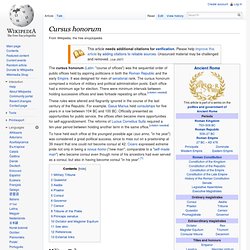
It was designed for men of senatorial rank. Roman Republic. The Roman Republic (Latin: Res Pvblica Romana) was the period of the ancient Roman civilization when the government operated as a republic.
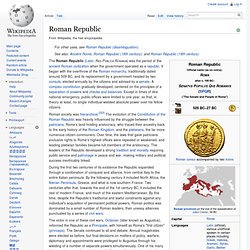
It began with the overthrow of the Roman monarchy, traditionally dated around 509 BC, and its replacement by a government headed by two consuls, elected annually by the citizens and advised by a senate. A complex constitution gradually developed, centered on the principles of a separation of powers and checks and balances. Except in times of dire national emergency, public offices were limited to one year, so that, in theory at least, no single individual wielded absolute power over his fellow citizens. Separation of powers. History[edit] Antiquity[edit] Montesquieu's tripartite system[edit] Montesquieu.

Constitution of the Roman Republic. The Constitution of the Roman Republic was a set of guidelines and principles passed down mainly through precedent.[1] The constitution was largely unwritten and uncodified, and evolved over time.
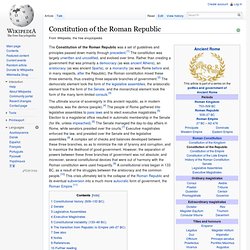
Rather than creating a government that was primarily a democracy (as was ancient Athens), an aristocracy (as was ancient Sparta), or a monarchy (as was Rome before and, in many respects, after the Republic), the Roman constitution mixed these three elements, thus creating three separate branches of government.[2] The democratic element took the form of the legislative assemblies, the aristocratic element took the form of the Senate, and the monarchical element took the form of the many term-limited consuls.[3] Constitutional history (509–133 BC)[edit] Democracy. According to political scientist Larry Diamond, it consists of four key elements: The term originates from the Greek δημοκρατία (dēmokratía) "rule of the people",[4] which was found from δῆμος (dêmos) "people" and κράτος (krátos) "power" or "rule", in the 5th century BC to denote the political systems then existing in Greek city-states, notably Athens; the term is an antonym to ἀριστοκρατία (aristokratía) "rule of an elite".
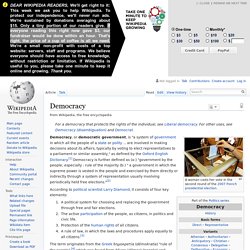
While theoretically these definitions are in opposition, in practice the distinction has been blurred historically.[5] The political system of Classical Athens, for example, granted democratic citizenship to an elite class of free men and excluded slaves and women from political participation. Parliamentary system. Map of different governmental systems Parliamentary republics with an executive president elected by and responsible to a parliament.
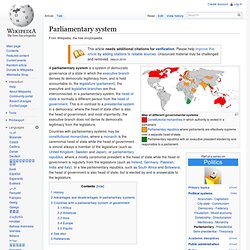
Direct democracy. Direct democracy (also known as pure democracy)[1] is a form of democracy in which people decide (e.g. vote on, form consensus on, etc.) policy initiatives directly, as opposed to a representative democracy in which people vote for representatives who then decide policy initiatives.[2] Depending on the particular system in use, it might entail passing executive decisions, the use of sortition, making laws, directly electing or dismissing officials and conducting trials.
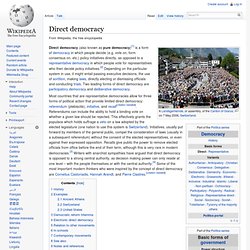
Two leading forms of direct democracy are participatory democracy and deliberative democracy. Most countries that are representative democracies allow for three forms of political action that provide limited direct democracy: referendum (plebiscite), initiative, and recall[citation needed]. Referendums can include the ability to hold a binding vote on whether a given law should be rejected.
Legislature. A legislature is a decision-making organization, usually associated with national government, that has the power to enact, amend and repeal laws.[1] Legislatures observe and steer governing actions and usually have exclusive authority to amend the budget or budgets involved in the process.
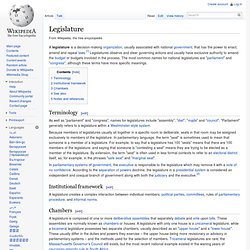
The most common names for national legislatures are "parliament" and "congress", although these terms have more specific meanings. Legislation. Deliberative assembly. A deliberative assembly is an organization comprising members who use parliamentary procedure to make decisions.
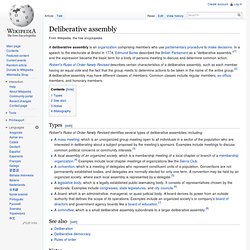
In a speech to the electorate at Bristol in 1774, Edmund Burke described the British Parliament as a "deliberative assembly,"[1] and the expression became the basic term for a body of persons meeting to discuss and determine common action. Robert's Rules of Order Newly Revised describes certain characteristics of a deliberative assembly, such as each member having an equal vote and the fact that the group meets to determine actions to be taken in the name of the entire group.[2] A deliberative assembly may have different classes of members.
Common classes include regular members, ex-officio members, and honorary members. Types[edit] Robert's Rules of Order Newly Revised identifies several types of deliberative assemblies, including: Statutory law. Codified law[edit] The term codified law refers to statutes that have been organized ("codified") by subject matter; in this narrower sense, some but not all statutes are considered "codified.
" Statute. Ideally all statutes must be in harmony with the fundamental law of the land (constitutional). This word is used in contradistinction to the common law. Statutes acquire their force from the time of their passage, however unless otherwise provided. Statutes are of several kinds; namely, Public or private. Declaratory or remedial. Temporary or perpetual. Black letter law. In common law legal systems, the term black letter law is used to refer to the technical legal rules to be applied in a particular area, which are most often largely well-established and no longer subject to reasonable dispute.
The term is not confined to one doctrinal area; one may speak of the "black-letter law" of contracts or the "black-letter law" of trademarks, for example. Should one wish to draw a distinction, one would typically contrast black-letter law and legal theory, or black-letter law and unsettled legal issues. History and etymology[edit] The phrase does not come from association with Black's Law Dictionary, which was first published in 1891. The phrase "black-letter law" was used in the Pennsylvania Supreme Court case Naglee v. Instead, it presumably refers to the practice of setting law books and citing legal precedents in blackletter type, a tradition that survived long after the switch to Roman and italic text for other printed works.
Similar phrases[edit] Social Security (United States) In the United States, Social Security is primarily the Old-Age, Survivors, and Disability Insurance (OASDI) federal program.[1] The original Social Security Act (1935)[2] and the current version of the Act, as amended,[3] encompass several social welfare and social insurance programs. Social Security is funded through payroll taxes called Federal Insurance Contributions Act tax (FICA) and/or Self Employed Contributions Act Tax (SECA). Tax deposits are collected by the Internal Revenue Service (IRS) and are formally entrusted to the Federal Old-Age and Survivors Insurance Trust Fund, the Federal Disability Insurance Trust Fund, the Federal Hospital Insurance Trust Fund, or the Federal Supplementary Medical Insurance Trust Fund which comprise the Social Security Trust Funds.[4] With a few exceptions, all salaried income, up to a specifically determined amount by law (see tax rate table below) has an FICA and/or SECA tax collected on it.
People for the Ethical Treatment of Animals (PETA) Patriotism. Patriotism is generally cultural attachment to one's homeland or devotion to one's country, although interpretations of the term vary with context, geography and philosophy. [citation needed] It is a related sentiment to nationalism.[1][2][3] Euroscepticism. Pan-European nationalism. This article is about those who claim that Europe is, or should be, a single nation. For the history and ideology of nationalism in Europe, see Nationalism. Pan-European identity. Pan-European identity refers to the sense of personal identification with Europe. Flat tax. A flat tax (short for flat tax rate) is a tax system with a constant marginal rate, usually applied to individual or corporate income. A flat tax falls under proportional tax as they allow certain deductions.
There are various tax systems that are labeled "flat tax" even though they are significantly different. Major categories[edit] Progressive tax. A progressive tax is a tax where the tax rate increases as the taxable base amount increases.[1][2][3][4][5] The term "progressive" refers to the way the tax rate progresses from low to high, with the result that a taxpayer's average tax rate is less than the person's marginal tax rate.[6][7] The term can be applied to individual taxes or to a tax system as a whole; a year, multi-year, or lifetime. Progressive taxes are imposed in an attempt to reduce the tax incidence of people with a lower ability-to-pay, as such taxes shift the incidence increasingly to those with a higher ability-to-pay. Euthanasia. Euthanasia (from Greek: εὐθανασία; "good death": εὖ, eu; "well" or "good" – θάνατος, thanatos; "death") refers to the practice of intentionally ending a life in order to relieve pain and suffering.
Euthanasia is categorized in different ways, which include voluntary, non-voluntary, or involuntary.